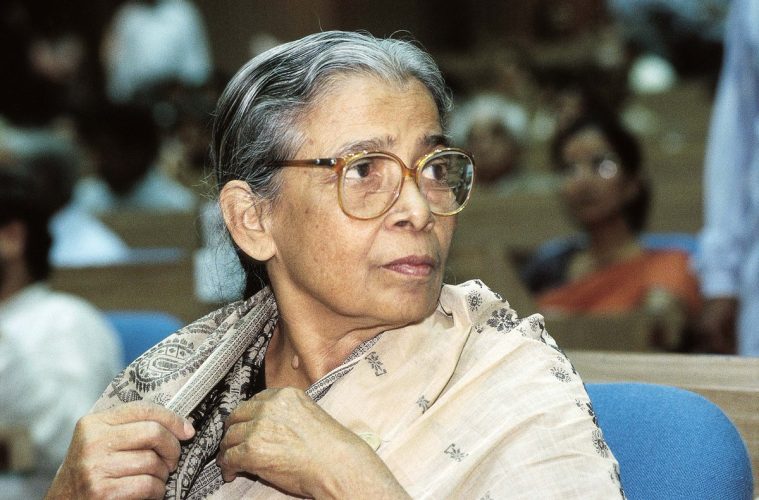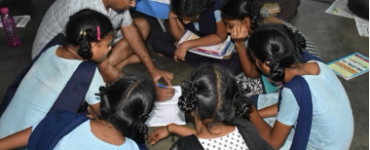Oka Talli; A novel in Bengali by Mahaswetha Devi, Telugu translation by Surampudi Sitaram, Hyderabad Book Trust, (1983, 1998); Pages 141; Price Rs. 18-00
Mahasweta Devi, one of the most prominent writers of 20th century India, was born in 1926 in Dhaka, East Bengal, now the capital of Bangladesh. Daughter of an illustrious father, Manish Ghatak, poet and a novelist, she was educated in the University of Calcutta and Shanti Niketan. She was married to Bijan Bhattacharya, a Bengali actor and playwright in Bengali. She inherited her father’s magazine Vartak in 1979 and used it circulate her concerns on rural Bengal. She travelled widely in the forests of Bihar and Bengal and gradually became the voice of the Adivasis and the forest dwellers of this region. She also actively spoke and wrote for the youth who were labelled as Naxalites and wrote short stories and novels on all these subjects. Hers was the voice of protest in India during 70s and she was there to support every movement that raised its voice against the oppression of marginalised communities. But hers was not just a voice of protest, it was a rumble of discontent heard in every nook and corner of India by her admirers and critics alike. She was also widely translated into many Indian languages. The government honoured her with a Sahitya Academy award in 1979, even though she associated herself with organisations that had little to do with government and established herself as a prominent social worker. She wrote articles in English and fiction in Bengali. Her Bengali writings have been translated into various Indian languages.
Mahasweta was known to have empathised with the Naxalite movement in early 70s. This novel places before our eyes the harsh realities of the life for the youth in 70s who were drawn into this movement.
The title Oka Talli (One Mother) is the story of one mother who was affected by the revolutionary movement. In fact, it is the story of hundreds of mothers in those days, including my own. The youth left their studies and were drawn into the ideological fervour of the Naxalbari movement. The independence that the country attained after a long non-violent struggle led by Gandhi left people with high expectations of freedom; political and economic and from social oppressions and unemployment. But within no time their dreams were shattered by the corrupt political establishments and their bureaucratic way. The heaven of freedom which they thought would be theirs and had driven them into euphoric expectations proved to be a failed dream. Revolutionary movements and protests were the order of the day during the 70s. The student wing of the Marxist Leninist party led the youth and Radical Student Unions were formed throughout the country’s universities. When Emergency was declared several youth left campuses to go underground. Those caught were killed mercilessly in the name of encounters. In those days every family used to have one missing member, underground, jailed or killed in encounters. They too were constantly retaliating and it became a war fought in the forests and in cities where educated youth were actively involved demanding freedom of expression, and sometimes, were even running parallel judicial and executive governance. While many innocent boys became victims of police brutalities, their families suffered as they were mostly in the dark about the unchanneled energies of their children and how they were put to use. The arrests and deaths shocked many families and mothers were the worst hit. This is the story of one such mother. It starts on one January 17th (which by a strange coincidence was the death anniversary of my own brother who was a well-known civil liberties activist and left-wing intellectual who went underground during the emergency and was later jailed for a speech he gave in the university condemning the curtailment of civil rights). This mother embarks on a journey of her son’s life two years after his death and gets to know him anew—his ideological fervour, his commitment to the cause of freedom and his active hostility for the policies of the established order and his truthful and sincere fight for his beliefs. The author highlights the plight of a revolutionary and how he was treated as a social outcaste, how people avoided him like a plague and how the father of the boy lived in total denial, trying to erase his son from their lives altogether. These details are all vividly revealed by the subconscious thoughts of the mother and her search for her son who was a stranger to her during his lifetime. Hazar Chaurasi ki Ma was the name of the Bollywood movie Govind Nihalani made in 1998as an adaptation of this book and it was a successful comeback movie for Jaya Bachchan in 1998.
The story opens on the day Sujata wakes up feeling it was a special day, her son’s birthday. Her son Prati left them two years ago on his birthday. Her mind goes back 22 years, to the day Prati was born: She got up with difficulty and slowly, painstakingly prepared her bag with all the essentials required to admit herself into the hospital for delivery. She had three children before that and every time she went alone to the hospital and came back home alone. Her mother-in-law who was at home would shift to her sister’s house as she cannot stand the sight of the hospitals. This time she was at home but did not offer to go to the hospital for this fourth delivery. Her husband was never at home for any of her needs. He never took her to the hospitals either for check-ups or came to visit his children in the hospital. His only interest in her was her body and he never paid any attention otherwise. She was so accustomed to her loveless life that it stopped bothering her. Early in their marriage she got a job in a bank and gradually rose to a senior position. Prati, though was a great burden to her as she had to take of him along with her three other children, she developed a deep bond and he too used to resent her going to the bank, leaving him alone. From an early age he disliked his father. Her husband blamed her for this. But when she first asked him why he disliked his father so much he replied that he had no personal animosity for the man named Divyanth Chatterjee. But since he cares for his money and property more than anything else, like many others of his class, the whole class were his enemies. She did not understand him and said so to which he said she would not understand as she had no inclination to think or know. But he talked to her and was attached to her and that day two years ago when police came asking for her son she was scared. They handed over the body to the family and what made her suffer more at that time was the manner in which her husband tried to erase all traces of their son from their lives. He used his influence to get his name removed from the official records. Prati’s belongings were shifted to the store room on the third floor. His photo, books and chappals were also removed. The telephone was shifted to her elder son’s room. She could not find a single memory of her son in the house. She demanded the key of the upstairs room and often used to sit in that room thinking of her son. Her mind used to churn out many questions and would logically try to analyse why Prati had turned away from the family and had secretively joined the revolutionary activities. The police confiscated his books, his posters and the slogans he and his friends were preparing for painting on the walls in the streets. The slogans told her many things about her son. When her husband and older son tried to justify the police’s action, she could clearly see the gap between a fiery young man, his revolting blood at the attitudes of corrupt establishments on the one hand, and the establishments, the intellectuals, the supporters of police brutalities, on the other. She sits alone in his room, takes out his shirts, touches them and finds solace and comfort in his clothes and his books. ‘Many more mothers like me,’ she would often think.
After Prati died, she visited the house of Prati’s friend, Samu (Samaresh). His mother, living in a very poor and deprived condition talked to her and described how on the last day Prati came to their house to save his friends from certain death. There was an informer who was responsible for Samu and his associates unknowingly entering a trap. Prati could not go back as all routes were closed and they all stayed in Samu’s house. In the middle of the night the attack took place. The crowd mercilessly killed Samaresh, Vijith and Parth and Prati. The police were just witnesses to the crime. The youngsters dared to question and demand rights for the citizens. The public were brainwashed into thinking that they were great traitors and law and order were constantly affected by their demonstrations. They were depicted as enemies of society. Sujata heard the story for the first time from Samu’s mother.
Nandini, the girl Prati loved, called Sujatha and said she wished to meet her. As that day was the engagement of her younger daughter Tuli, Sujata told her that she would meet her outside the house somewhere and be back to attend the party later. Tuli was busy looking after the arrangements for her engagement as she hardly trusted anyone. Bini, her first daughter-in-law was getting ready for the engagement party. Even the police officer who was actively involved in trapping Prati was invited and Tuli justified his action as a great national duty. For everyone in the house like her husband, Tuli and Bini, Prati died much before he actually died. Sujata considered all of them as her enemies. Nandini tells her of her relationship with Prati, how they planned to marry. She was in prison when Prati was killed. She told her about the betrayal of Anindya, one of their associates. She describes her torture and the third degree used on her while in custody. The headlights constantly focussed into her eyes damaged them permanently. Sujata feels great affection for Nandini. She was the girl her son loved but did not want to bring to their house. Prati told her but never introduced her to his mother. Nandini tells her she may not see her again.
She goes back home and the party already started and she saw the police officer who was responsible for Prati’s death, invited to her house. She feels betrayed, overwhelmed. Her appendicitis which was begging to be removed for long bursts and she collapses with a long scream.
Mahasweta fills a gap in our understanding of the revolutionary movements in our political and literary writing. The youngsters who sacrificed their lives for a cause they genuinely believed in, never thought families were their priority. Young men like Prati were distanced by busy, selfish parents, indifferent siblings and corrupt establishments. They fuelled this ideological fervour, which obliterated every other concern in their life. Revolutions, especially the left oriented movements were self-destroyed by their own internal power struggles and one ends up feeling that the young lives could have been different had their intellectual energies been diverted to more meaningful reform-based activities than self-destructive violent activities. Many questions remain unanswered. Would Sujata have suffered less had she been aware of her son’s ideological leanings? Could she have helped to channelise his mind by a more constructive debate? She was the only member he was attached to in his family.
Other larger questions also arise, such as why was it that those who talk of ideals safeguard their properties, their careers and their bank balances before inspiring the young impressionable idealogues? Once out of the prime of youth, they consolidate their lives relationships and live as just the shadows of what they projected themselves to be in their youth. Only the genuine believers in the revolution, very few in number go on to abandon their families and cause untold distress to their mothers. But…it is they who gain the respect and recognition long after their death. They never die, those who live nurtured by live volcanos.
*









The hindi dramatised 1084 was performed in Delhi in late Seventies in SRC directed by Rajindernath. It was a well crafted play and depicts the Mother (of 1084) feelings very well. She is quite proud of her son. I asked many telugu writers to dramatise this novel.